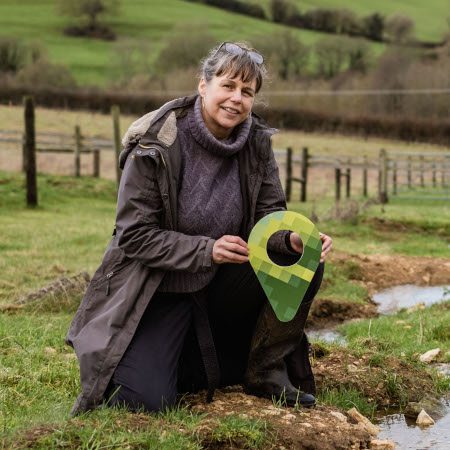Meet Denise
Denise Smith
Hammonds Farm, Natural Flood Management
“The natural flood management scheme means we are ready for what each season brings to the farm.”
The team at Hammonds Farm is working with Stroud District Council, taking part in its ambitious natural flood management project, using natural materials and methods to reduce flooding.
Denise Smith, Hammonds Farm explains, “Hammonds Farm has mixed livestock, including cows, goats and pigs, a market garden and we are establishing an agro forestry scheme to grow walnut and cobnut, apple and pear trees under planted with soft fruit bushes and garlic.”
She continues, “Our farm borders Painswick Stream on one side and has a natural spring at the other. The previous landowner piped the spring water under the fields to drain straight into the stream, but at times of high rainfall this really increased the chance of flooding. The natural flood management team broke the pipe so that the water from the spring can soak into the fields and dissipate before reaching the stream. This lightens the load of the stream and greatly reduces the flood risk.”
Without the underground pipe, the spring and rainwater now creates a small pond that fills and overflows before meandering to the Painswick Stream. Slowing the flow of the water not only reduces the chance of flooding but is better for the wildlife and also the soil, reducing erosion and run off into the stream.
Denise says, “Working with the specialists at Stroud District Council we now have a solution that has created a diverse wetland habitat in the fields, encouraging a different eco system and bringing in wildlife that we have never had before on the farm. We can now also access the spring for irrigation to water our crops.”
Stroud District Council began its project of natural flood management in 2014. Since then the project team has worked in partnership with local wildlife trusts, The National Trust, Natural England, other councils, and the University of Gloucestershire. By going upstream of the problem, the project has delivered excellent results. It has also contributed to the circular economy in Stroud District with over 25 local land managers and contractors engaged in the project.
- 750 interventions along the Stroud catchment
- 25% of the catchment is now draining through natural flood management.
- 1 metre reduction in peak river levels along the Slad Brook.

